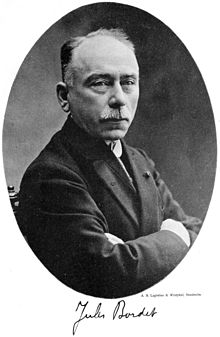Jules Bordet
Jules Bordet | |
|---|---|
 | |
| Born | Jules Jean Baptiste Vincent Bordet 13 June 1870 |
| Died | 6 April 1961 (aged 90) Brussels, Belgium |
| Resting place | Ixelles Cemetery |
| Nationality | Belgian[1] |
| Alma mater | Free University of Brussels |
| Awards | |
Jules Jean Baptiste Vincent Bordet (immunologist and microbiologist. The bacterial genus Bordetella is named after him. The Nobel Prize in Physiology or Medicine was awarded to him in 1919 for his discoveries relating to immunity.
Education and early life
Bordet was born at
Elie Metchnikoff, who had just discovered phagocytosis of bacteria by white blood cells
, an expression of cellular immunity.
Career
In 1895 Bordet made his discovery that the
August von Wassermann
). The same technique is used today in serologic testing for countless other diseases.
With
whooping cough. He became Professor of Bacteriology
at the Université Libre de Bruxelles in 1907.

Awards and honours
In March 1916, he was elected a Foreign Member of the
Felix d'Herelle did not exist and that bacteria destroyed themselves using a process of autolysis. This theory collapsed in 1941 with the publication by Ruska of the first electron microscope pictures of bacteriophages.[4] The Nobel Prize in Physiology or Medicine
was awarded to him in 1919 for his discoveries relating to immunity.
Bordet died in 1961 and was interred in the Ixelles Cemetery in Brussels.
- 1919: Member of the Royal Academy of Science, Letters and Fine Arts of Belgium.[5]
- 1921: Awarded the Cameron Prize for Therapeutics of the University of Edinburgh.
The Bordet railway station in Brussels is named after him.
The cancer hospital Institut Jules Bordet is also named after him.
References
- ^ "The Nobel Prize in Physiology or Medicine 1919".
- S2CID 73062171.
- ^ "Library and Archive Catalogue". Royal society. Retrieved 18 December 2010.[permanent dead link]
- ISBN 0230551939
- ^ Index biographique des membres et associés de l'Académie royale de Belgique (1769–2005).
- Jules Bordet (John Wiley & Sons, link from Internet Archive.
